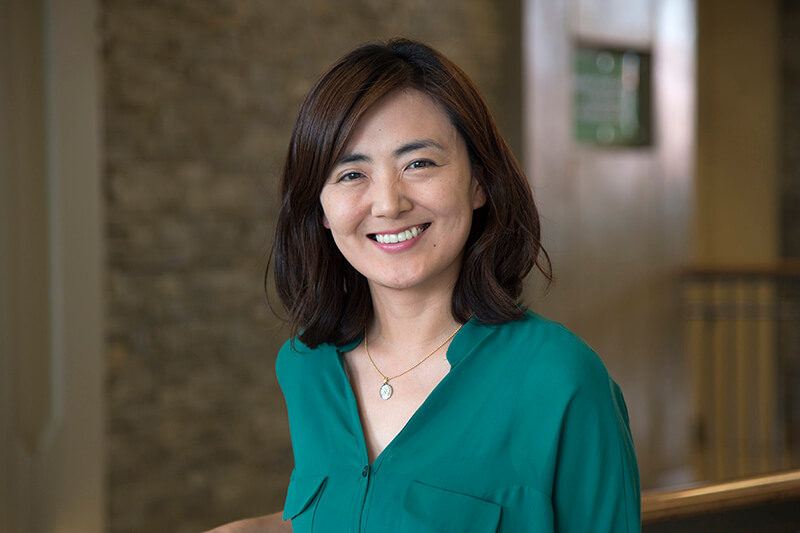March 21, 2017
Purdue Profiles: Jiyeon Lee
 Jiyeon Lee, assistant professor of speech, language and hearing sciences, directs the Aphasia Research Laboratory; studying language disorders in stroke survivors and teaches courses on aphasia and related neurogenic communication disorders. Photo provided.
Download image
Jiyeon Lee, assistant professor of speech, language and hearing sciences, directs the Aphasia Research Laboratory; studying language disorders in stroke survivors and teaches courses on aphasia and related neurogenic communication disorders. Photo provided.
Download image
Jiyeon Lee, assistant professor of speech, language, and hearing sciences, had always pictured herself as an English teacher in South Korea. That is until she had a professor who focused on aphasia, which is the loss of ability to understand or express speech, caused by brain damage.
She became fascinated with how language is affected in people with aphasia following a brain injury.
Now, she directs the Aphasia Research Laboratory, studying language disorders in stroke survivors and teaches courses on aphasia and related neurogenic communication disorders. She has a bachelor's in English from Ajou University in South Korea, a master's in linguistics from the University of Wisconsin-Milwaukee and a doctorate in communication sciences and disorders from Northwestern University. She is also a certified speech-language pathologist.
What does your work/research focus on and why is this important?
The primary focus of my research is to identify how language breaks down in persons with aphasia following brain injury, mostly stroke, and the factors that facilitate regaining of their language functions. The goal is to create more effective treatments for these individuals. For example, we study how persons with aphasia process information while listening and speaking by tracking their eye movements. We also study the impact of different types of cues on their long-term relearning of language.
This work is important because stroke is very common in elderly individuals and one-third of stroke victims end up with communication difficulties. Studies have shown that aphasia has a more devastating impact on a person’s quality of life than cancer or Alzheimer’s disease. Although we now know that the brain has ability to continue to recover even many years after stroke, there are not many effective language treatments available for these patients. I hope my research can ultimately help to fill this need.
What inspired you to pursue this career path?
It was actually one of my courses in school that led me into this career. I came to the U.S. to study linguistics, hoping that one day I would go back and teach English in South Korea. During my master’s program, one of my professors taught aphasia in his course and I instantly fell in love with the topic. What fascinated me was that even when the human brain stops functioning normally, it produces systematic errors. So I wanted to study what is causing those errors and how to correct them effectively.
What is the most challenging part of your work or research?
I am still learning each day to better balance many responsibilities including teaching, mentoring, research and other administrative duties. Because the aphasia research program is still being established at Purdue, there is much work to be done, including reaching out to individuals with aphasia, who are often not mobile and sometimes are isolated as a result.
What is your favorite part of your work?
Interacting with persons with aphasia! Although they are not the most accurate communicators, because of their limited ability to speak, they communicate very effectively and teach you a great deal through the wisdom and strengths that they gained after surviving a traumatic life event and successfully living with aphasia. Working with individuals affected by aphasia is a really reciprocal and rewarding process.
What are you doing to advance awareness of aphasia and aphasia research in the community?
My colleague, Michelle Gutmann, clinical associate professor in speech, language, and hearing sciences, and I are working to launch the Purdue Aphasia Bootcamp, a clinical aphasia research program, in summer 2017. Sponsored by Purdue SLHS department and IU Health Arnett, this two-week intensive aphasia treatment program will provide individualized and group treatment sessions to chronic patients with aphasia, who are often not eligible for speech therapy because of limited healthcare reimbursement, as well as support and education to their caregivers. We will study the impact of this program not only on their communication abilities, but also on the participants and caregivers’ overall quality of life. Taking a collaborative approach, we will work together with local health care professionals and graduate student clinicians to implement this program.
Writer: Megan Huckaby, 765-496-1325, mhuckaby@purdue.edu

